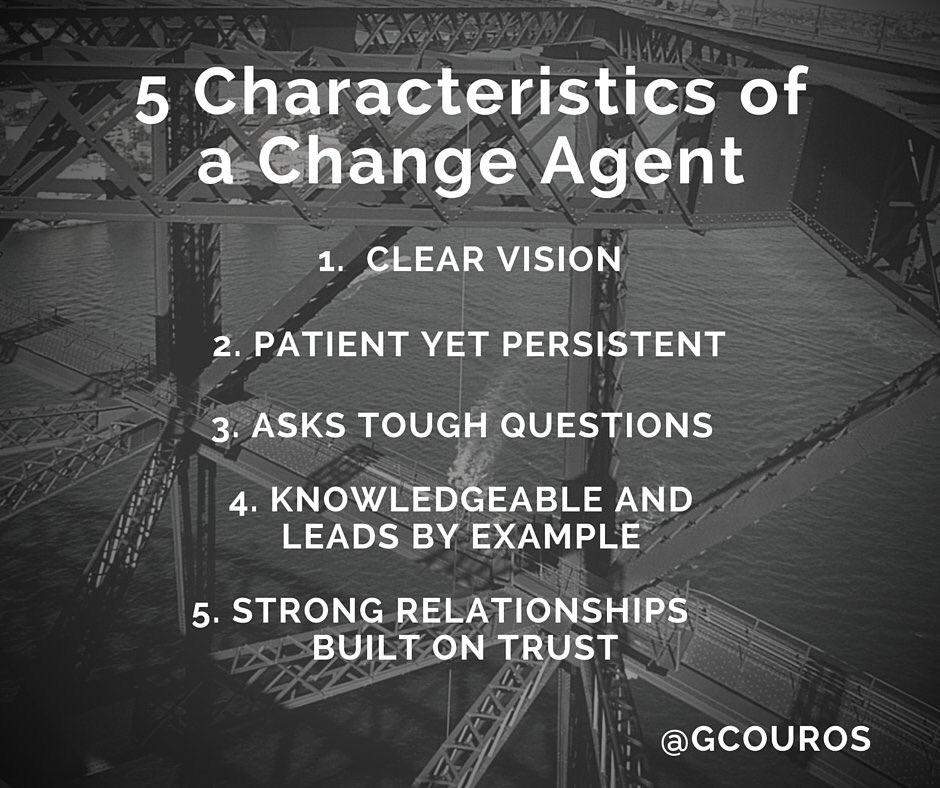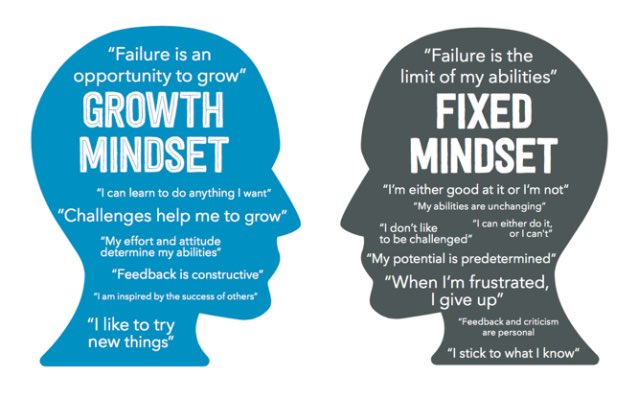This morning's #SatChat moderated by @DruTomlin_AMLE truly resonated with me as the focus was on "Leading Schools and Education Reform" with a focus on what are change agents and how do they facilitate change in a school or organization? The tweets were fast and furious but I wanted to take time today in this blog post and reflect upon my answers and others.
Q1 7:36 What are the characteristics of an effective change agent in a school?
Dru posed a terrific question and I could fill several blog posts on this questions alone. In my role as Director of Educational and Information Technology, as technology moves at a rapid rate; my daily role is slowing things down so that I make pedagogical, budgetary, leadership, and operational decisions based on our collaborative and thoughtful strategic academic plan, not on what is the latest #EdTech product. I have a very clear vision distilled from that academic plan and I am consistently navigating toward those embedded goals. When Dru posed his question this morning, my reply was easy as I have only been successful in realizing my vision because of the relationships I have invested in. Relationships are key in shaping my vision as I am fortunate to work with an amazing leadership team and a strong and creative faculty. If you work toward garnering a strong foundation of trust and can clearly communicate your underlying"why" of your vision, you have a high degree of success likely. Of course, you will need to persist through the challenges that any change brings. I like to think of these challenges as the necessary checks and balances to ensure that you are on the right path. Randy Pausch, author of The Last Lecture, called these challenges "brick walls put there to see how much you really want something'. So persistence is another key characteristic of an effective change agent but that also requires being patient, having a deep well of humor and yet one more key characteristic, a strong EQ. Change is hard and possessing a strong emotional intelligence (EQ) will help you work through some of the more human challenges. Someone in the chat reminded me of the excellent post George Couros (@gcouros) wrote in 2013 that "5 Characteristics of a Change Agent"which summarize the key characteristics of an effective change agent.
Q2 7:44 How do you create and sustain change as a school leader?
While persistence is key, you need to lead by example. Sometimes that means you are a cheerleader, sometimes a shepherd and every once a while, a wrangler. All of this requires that you take care of yourself as you will need a lot of stamina on those more challenging days. @BeckettHaight is right though, you need to set your priorities and keep the end in mind.

Q3 7:52 What is one reform that you are working on at your school? Why is that so critical?
Staying true to your vision and mission through a collaborative and thoughtful academic strategic plan provides a fairly clear road map toward achieving your goal (s). Design Thinking has been and will continue to be a focus as it builds nicely upon of culture of visible thinking and moves us closer to creating a culture where asking the right question is more valued than giving a "right" answer.
It was fascinating to see the breadth of reforms that schools/organizations are working on from grading to innovation to technology usage. Change is hard but realizing how many educators are in similar positions to your organization is helpful.Virtual support and guidance abounds in twitter making it the best source of professional development.
Q4 8:00 What resources (tech, articles, books, protocols) do you use to foster change and reform?
My PLN is a formidable resource and sounding board but don't forget the community around you. take time to ask tough questions as George Couros suggests and listen with an open heart to the feedback of your team. Sometimes the feedback may not be what you want to hear but if you have a strong team, they will keep you honest.
Q5 8:08 How do you help external stakeholders (families, district) understand and work on school change efforts?
Communication is key but you need to remember that communication must be two way. Seeking feedback from all your stakeholders is essential. Although this tweet occurred earlier in the chat, @jbhanlon underscores the need to develop a supportive culture where all voices and input are welcome.
Q6 8:18 If reform was a food for schools, what kind of food would it be and why?
In the end, I believe that above all else, transformational leaders have a growth mindset and encourage this culture in those around them. I love this image below posted by @miriamcheuk today. Transformational leaders enable change because they themselves believe in growth, they understand the risk of change but they also believe in being bold and taking worthwhile risks. Be bold, listen, lead with your mind and with your heart and in the end, keeping a focus on what is best for your students will provide the right culture to change when necessary.














No comments:
Post a Comment